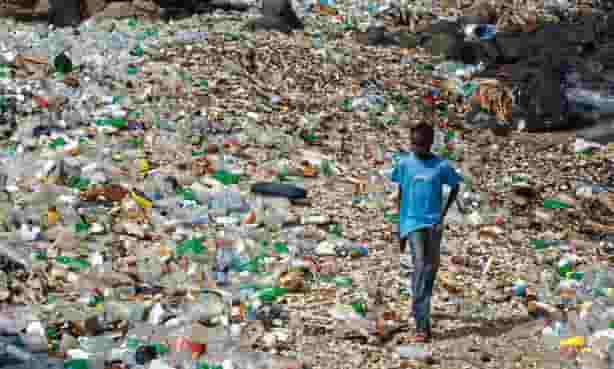New bioplastics are being made in laboratories from straw, wood chips and food waste, with researchers aiming to replace oil as the source of the world’s plastic.
The new approaches include genetically modifying bacteria to eat wood and produce useful chemicals. But the bioplastics are currently significantly more expensive to make than fossil fuel-based plastics.
Land and seas around the world, from high mountains to deep oceans, have become polluted with plastic, prompting major public concern. The world has produced 8bn tonnes of plastic since the 1950s and demand is still rising.
While some waste plastic is recycled, much of it is incinerated to produce electricity, resulting in carbon emissions that drive climate change. In contrast to plastic made from oil, plastics made from plant-based materials only release the carbon the plants absorbed from the air as they grew. Bioplastics will also give more options for products that biodegrade in the environment, although they can be made very long-lasting if required.
“Plastics are an incredible enhancement to our daily lives,” said Paul Mines, CEO of Biome Technologies in the UK, which has spent £5m in the last five years on bioplastics research. Plastic is both light and strong, he said: “But we can’t go on using fossil fuel-based materials. About 6-7% of every barrel of oil is used to make plastics.”
Using plant materials is feasible, said Prof Simon McQueen-Mason, at the University of York. Replacing half of the nation’s plastic bottles could be done using just 3% of the sugar beet crop, 5% of wheat straw or 2.5% of food waste, he said.
“These are the scales we would need to see a large-scale replacement of oil-based plastics,” he said. “It is something that would be practical within the UK, and we’re talking about a very big economic opportunity.” The UK plastic production industry has an annual turnover of £25bn.
Currently, just a few thousand tonnes of bioplastic are used in the UK each year, compared to millions of tonnes of conventional plastic. Mines said this could rise to about 20,000 tonnes in the next five years.
One technology now being scaled up from the lab is using a Rhodococcusbacteria to break down lignin, the very tough material that gives trees and other plants their strength. The bugs naturally eat lignin but Prof Tim Bugg, at the University of Warwick, working with Biome Technologies, has genetically engineered them so they produce useful chemicals for a bioplastic that can be used for bottles.
Lignin was long seen as impossible to break down usefully, but Bugg said: “Ten years on [from when I started], people are now saying it may well be possible.”
Lignin is a major waste product in paper and card manufacturing and is currently burned. “We shouldn’t be burning biomass, because we can make electricity and heat in more sustainable ways,” said McQueen-Mason. “But we don’t have any other source of the complex carbon chemistry we need to make the fuels, plastics and chemicals that currently come from petroleum.”
Prof Janet Scott, at the University of Bath, is tackling the problem of plastic microbeads, which have been banned from facewashes and other products in the UK and elsewhere. “We didn’t just put in microbeads into products for the heck of it,” she said. “You might have bought a skin exfoliant that had microbeads in to make it slightly rough and to make you glow and look gorgeous.”
Scott’s answer is to push dissolved cellulose – another tough plant material – through tiny holes and use chemistry to form the drops into tiny biodegradable beads.
Companies around the globe are working on bioplastics, including major players such as BASF, Novamont and DowDuPont, said Mines: “This is a global movement.”
Using food crops to make biofuels has been controversial as it may cause price rises, and there is wariness about using food to make plastics. But McQueen-Mason said the approach should not be dismissed: “You can produce as much sugar in North Yorkshire per hectare with sugar beet as they produce in São Paulo state in Brazil with sugar cane. Sugar beet is an incredibly effective crop in the UK and farmers love it.”
Some companies are currently using chicory and Jerusalem artichoke to make bioplastics, he said, because these contain fructose, which is closer to the chemicals required than the sucrose found in sugar beet.
Plastic has become ubiquitous not only because it is useful, but also because it is extremely cheap, and this presents the biggest challenge to bioplastics. People will pay a premium for some bioplastic products, such as biodegradable coffee pods that can composted, but Mines said: “I can’t predict if it will ever reach parity.”
Related Topics

